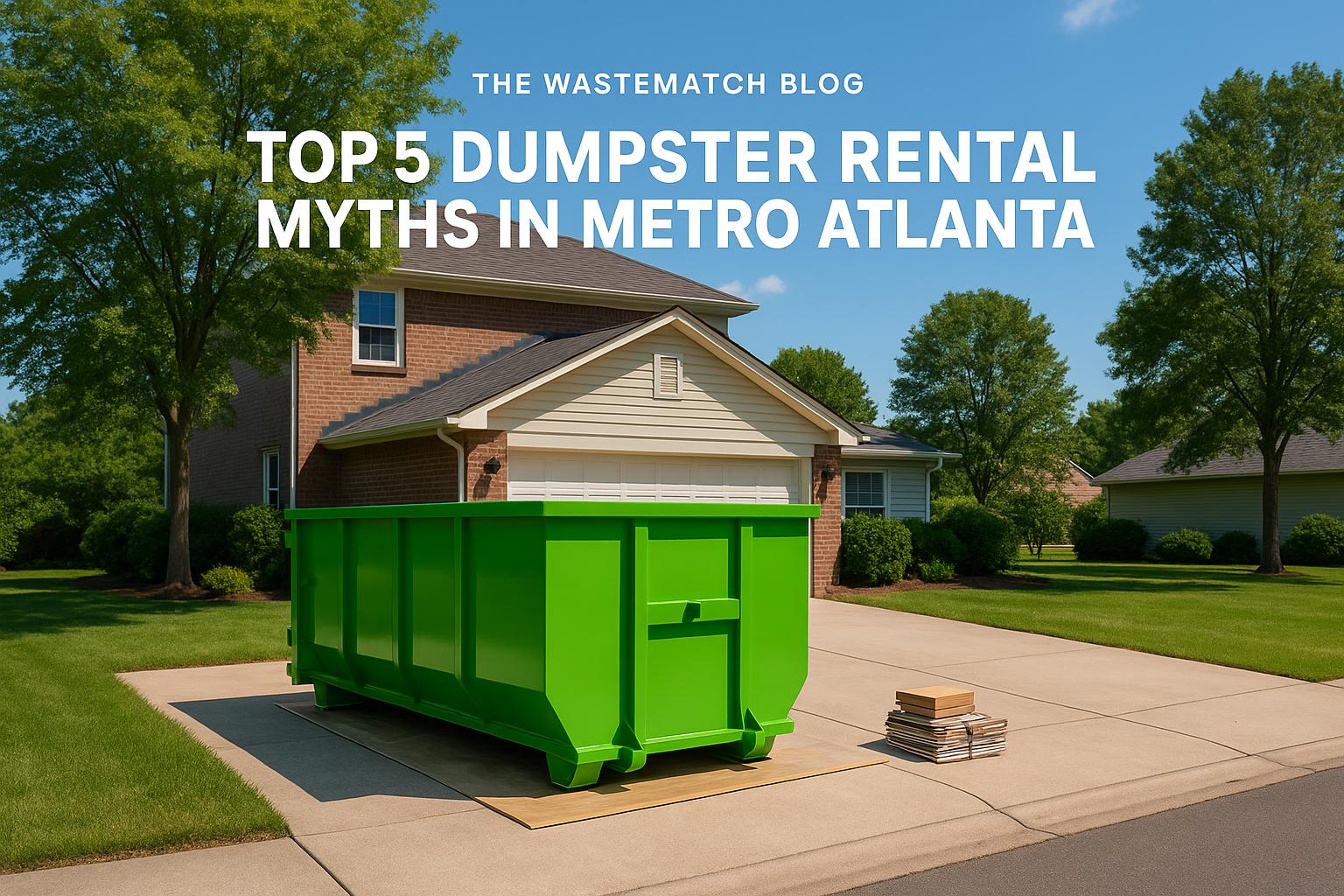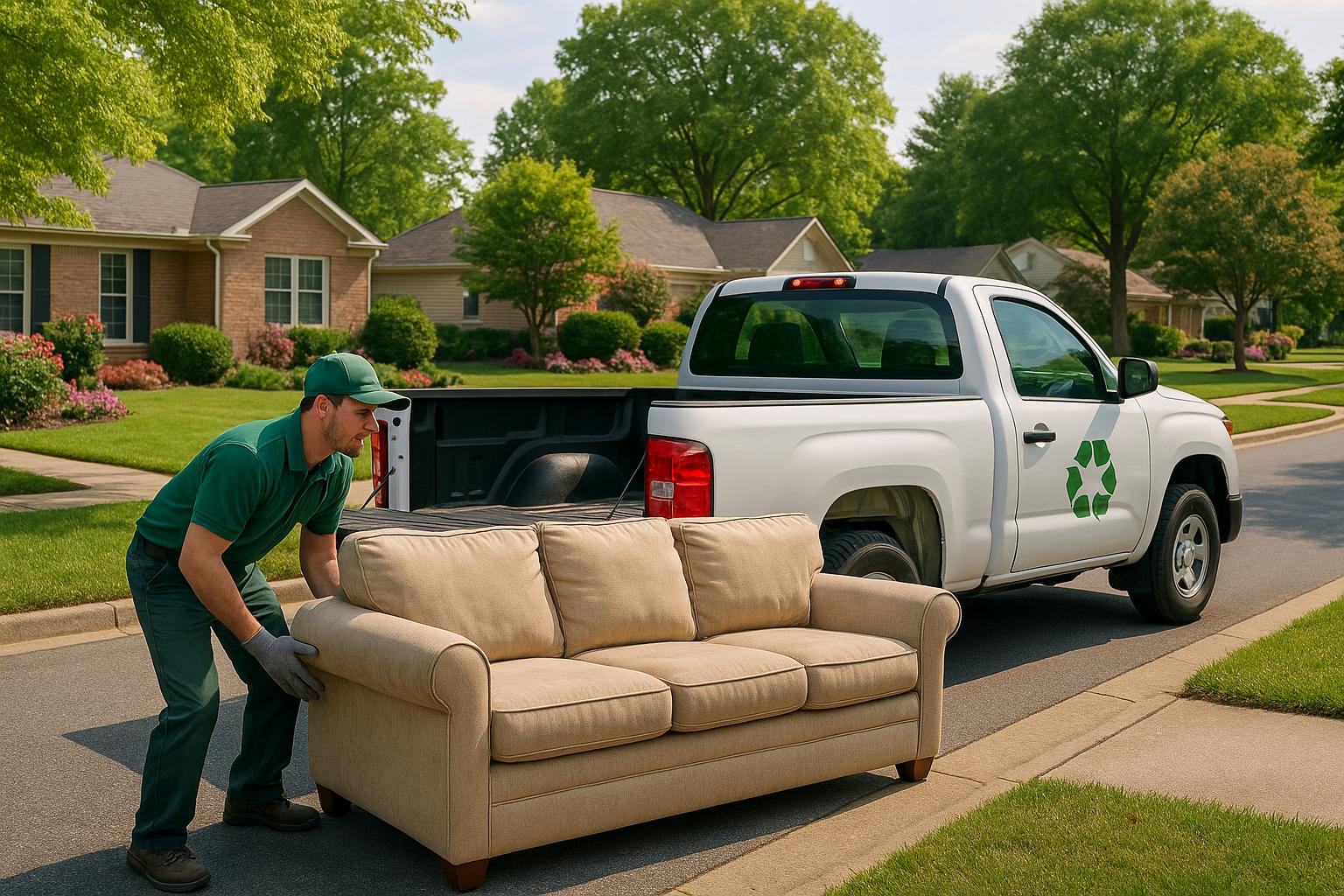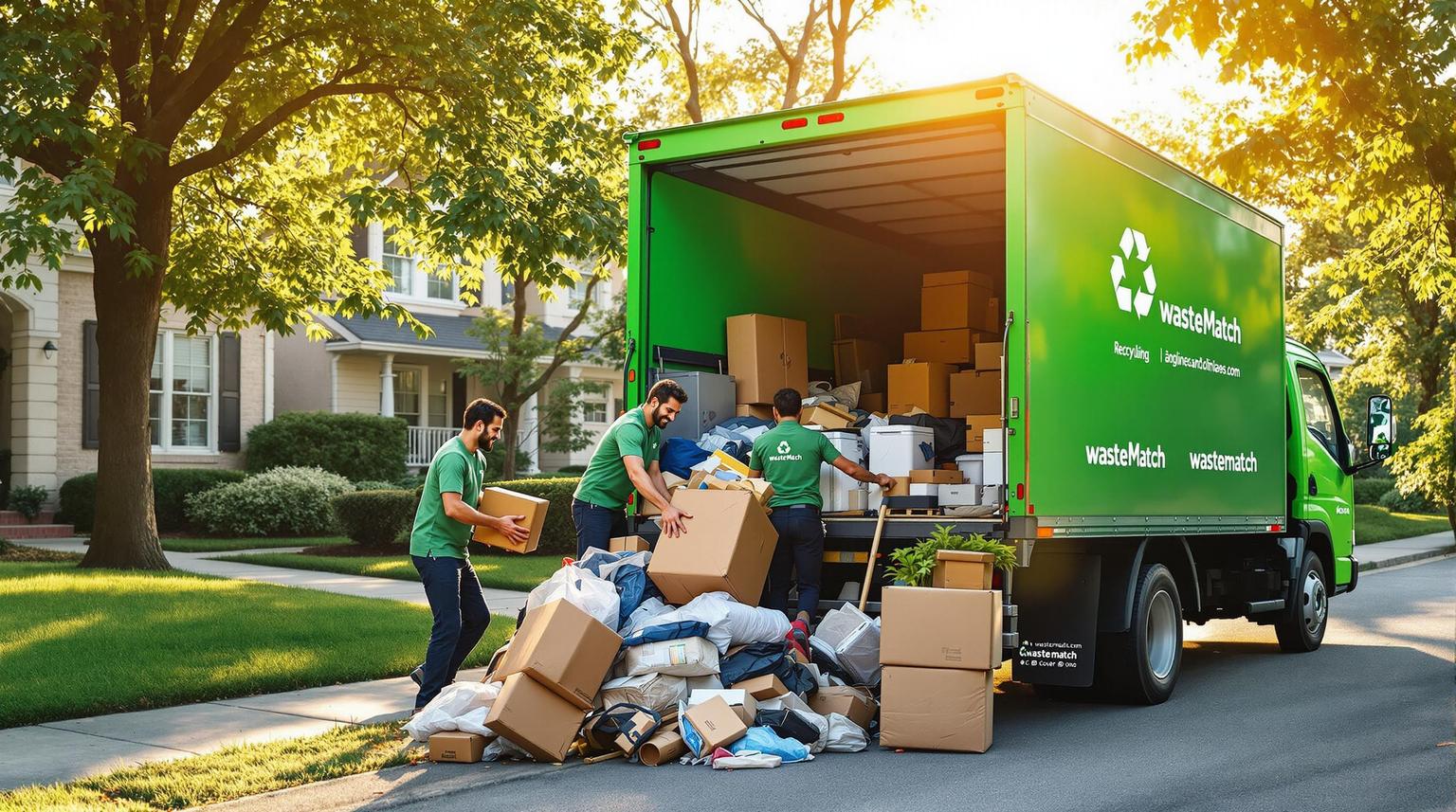Moving out or decluttering your apartment in Atlanta? If you’re tired of dealing with tight parking, strict building rules, or figuring out where to dump bulky furniture, you’re not alone. Many renters and property managers face these same headaches. That’s where WasteMatch steps in to simplify the process.
Whether you need a dumpster for a weekend move or a larger cleanout, WasteMatch handles everything - from finding the right size to scheduling pickups. No more guesswork or juggling permits and building approvals.
Here’s what you’ll get:
- Dumpster sizes that fit your space (from 10-yard to 30-yard options)
- Clear pricing with no hidden fees
- Local haulers who understand Atlanta’s rules
Let’s make your apartment cleanout simple, fast, and stress-free.
The Complete Roll Off Dumpster Rental Guide
How to Pick the Right Dumpster Size for Your Apartment Cleanout
Choosing the right dumpster size for your apartment cleanout can save you time, money, and hassle. It’s all about matching the container to your waste volume while considering building constraints. Apartment cleanouts often involve shared spaces, neighbor access, and management approvals, which makes planning ahead especially important. Unlike home cleanouts, where larger dumpsters can easily fit in driveways, apartments require a bit more logistical finesse. WasteMatch offers helpful guidelines to simplify this process.
Dumpster Sizes Available in Atlanta
For most single apartment cleanouts, a 10-yard dumpster is a solid choice. It’s compact enough to fit in tighter spaces while offering enough capacity for waste from a one- or two-bedroom unit. If your project involves bulkier items - like mattresses, couches, or a mix of furniture and smaller items - a 15-yard dumpster provides a bit more room without becoming unwieldy.
For larger cleanouts, such as major renovations or disposing of significant amounts of household goods and appliances, a 20-yard dumpster might be the better fit. Tackling multi-unit cleanouts or large-scale renovations? A 30-yard dumpster can handle the extra load, but keep in mind it requires more space for placement. Once you’ve narrowed down your options, calculate your waste volume to ensure you’ve picked the right size.
How to Calculate Space Needed for Common Items
Start by making a list of your larger items. Furniture and appliances, for example, take up more space than you might expect, while smaller household items can often be compressed. A fully packed room can produce more waste than it seems at first glance, so it’s wise to leave some wiggle room in your estimates. When in doubt, opting for a slightly larger dumpster can be more economical than having to rent a second one later.
Where to Place Dumpsters in Apartment Buildings
Once you’ve settled on the right size, the next step is figuring out where to place the dumpster. Common options include parking lots, loading dock areas, or, in some cases, the street. If you’re using a parking lot, coordinate with building management and neighbors to ensure the dumpster won’t block traffic or emergency access. Avoid placing it directly under windows to reduce noise disturbances during loading.
Loading docks can be ideal for larger complexes, but make sure there’s enough clearance for trucks to pick up the dumpster without issues. In dense urban areas, street placement might be your only option. If that’s the case, you’ll likely need a permit from the City of Atlanta, so factor in the time and cost for processing.
To make loading more efficient, position the dumpster near an elevator or ground-floor exit whenever possible. This can save a lot of effort when moving items from your apartment to the container. Also, consider protecting the surface beneath the dumpster with materials like plywood to prevent damage to pavement, which could lead to additional repair expenses.
Atlanta Regulations and Apartment Complex Rules You Need to Know
Understanding Atlanta's waste disposal rules and apartment policies is key to avoiding fines and delays. These guidelines determine where and how you can place your dumpster.
Local Rules for Dumpster Placement
In Atlanta, the placement of your dumpster depends on whether it’s on public or private property. If it’s on private property - like an apartment parking lot - you won’t need a permit. However, placing a dumpster on public property, such as streets, sidewalks, or alleys, requires approval from ATLDOT.
Permit applications should be submitted at least five business days in advance. The city mandates that dumpsters on public property must not obstruct traffic or create safety risks. Additionally, roll-off dumpsters typically require a minimum of 60 feet of straight-line clearance for delivery. The area should also be flat and free from low-hanging branches or wires. If you’re handling construction or demolition debris on public streets, you may need an extra permit from the Department of Public Works. Keep in mind, property owners are responsible for any damage to public areas during the waste removal process.
Items You Cannot Put in Dumpsters
Certain materials require special handling and cannot be disposed of in standard dumpsters. WasteMatch advises checking local guidelines to confirm which items are allowed. If you’re unsure about specific waste, it’s best to consult WasteMatch before loading your dumpster.
Getting Approval from Apartment Management
Apartment complexes and HOAs often have detailed rules about dumpster rentals. These may include restrictions on how long a dumpster can remain visible and specific hours for deliveries and pickups. To avoid issues, contact your apartment management or HOA early in the planning process. Confirm any placement rules, time limits, or additional requirements they may have. Securing written approval beforehand ensures a smoother experience and helps prevent conflicts with management. By addressing these details ahead of time, you’ll be better prepared to coordinate with WasteMatch and keep your project on track.
sbb-itb-c7714ed
Making Your Cleanout Easier with WasteMatch

Once you’ve got the necessary approvals and a handle on local regulations, WasteMatch takes the hassle out of apartment cleanouts. The platform connects you with reliable local haulers and handles everything from scheduling to transparent pricing and pickup coordination. It’s designed to remove the guesswork and make the process as smooth as possible.
How to Schedule Your Dumpster Rental
With WasteMatch, scheduling is straightforward and flexible. Whether you need a same-day rental or want to plan up to a week in advance, the platform has you covered. Plus, pricing is upfront - no hidden fees or surprise charges. You’ll know exactly what you’re paying before you book.
Deliveries typically occur within a 2-hour window, and you’ll get notifications with the driver’s estimated arrival time. This flexibility is especially helpful for apartment residents juggling building management rules or limited parking. Once your dumpster is delivered, proper loading is essential to make the most of the space.
How to Load Your Dumpster Properly
To use your dumpster effectively, start by breaking down large items and flattening boxes. Load the heaviest materials first to keep the dumpster stable, and work systematically from one end to the other. If you’re disposing of recyclables, set them aside for proper handling.
Fill any gaps with smaller items to maximize capacity. If your dumpster has a walk-in access door, take advantage of it to safely load heavier or awkwardly shaped items instead of tossing them over the sides.
Always stay within the dumpster’s fill line. Overfilling can create safety risks, result in fines, or even lead to a refusal of pickup, which could delay your cleanout. Once everything is loaded, WasteMatch ensures a seamless pickup process that aligns with the needs of your apartment community.
Pickup Coordination and Neighbor Considerations
To keep things running smoothly, WasteMatch schedules pickups during standard business hours to minimize disruptions. Make sure the area around the dumpster is clear - haulers usually notify you about 30 minutes before they arrive. The actual pickup process typically takes just 10-15 minutes.
If noise or timing is a concern, you can share specific requests when booking through WasteMatch. The platform works with haulers who specialize in residential pickups and understand the importance of maintaining good relationships with apartment communities and property managers. This way, the process is efficient and respectful of everyone involved.
How to Avoid Fines and Dispose of Waste Properly
Ignoring Atlanta's waste disposal rules can lead to hefty fines and even legal troubles. Both local authorities and apartment complexes enforce strict guidelines, so understanding these rules ahead of time can save you from unnecessary headaches and keep your cleanout project on track.
Common Reasons for Fines in Atlanta
One of the most frequent causes of fines is the improper disposal of prohibited items. Georgia law takes littering and illegal dumping seriously, with penalties ranging from fines to potential jail time for severe violations. Items like paint, batteries, and flammable materials are considered hazardous and cannot be tossed into regular dumpsters. Many apartment complexes even use video surveillance to monitor dumpster use and catch unauthorized dumping of these items.
Another common issue is blocked access penalties. Dumpsters that obstruct fire lanes, handicap spaces, or emergency vehicle routes can lead to fines. Additionally, Atlanta requires permits for dumpsters placed in public areas like streets or sidewalks. Violating waste disposal policies outlined in your lease agreement can also result in fines from your apartment management. Knowing these potential risks allows you to handle disposal responsibly and avoid penalties.
WasteMatch's Approach to Responsible Disposal
WasteMatch works with haulers who prioritize recycling and donating items whenever possible. They also help direct hazardous materials to the proper facilities. By keeping reusable items out of landfills, WasteMatch promotes a responsible and efficient disposal process, making compliance with regulations much easier.
Pre-Pickup Checklist for Compliance
To stay within Atlanta's regulations and your apartment's policies, follow this checklist before your scheduled pickup:
- Check your lease and building policies to ensure your dumpster placement complies with the rules and doesn’t include any prohibited items.
- Remove hazardous, toxic, flammable, or restricted materials from your waste. If you’re uncertain about an item, reach out to your WasteMatch hauler for clarification.
- Clear the pickup area of any obstructions like parked cars or debris. If the dumpster is in a shared space, work with your apartment management to avoid any conflicts.
Ready to Book Your Dumpster Rental with WasteMatch
Once you've taken care of any necessary approvals and compliance steps, booking your dumpster rental with WasteMatch is simple and hassle-free. You can focus on your cleanout without wasting time on complicated arrangements.
Head over to WasteMatch's website, click on "Find a Dumpster," and enter your ZIP code. From there, you'll see real-time availability and upfront pricing. For an even quicker option, use the "⚡ Quotes in Minutes" feature - just snap a photo, upload it, and instantly get your price. This user-friendly process eliminates the need for long phone calls or in-person visits, making it easy to compare options and select the perfect dumpster size for your project. Whether you're tackling a home cleanout or managing a commercial job, WasteMatch offers same-day or scheduled drop-offs.
With a focus on quality and dependability, WasteMatch ensures that all local haulers are fully licensed, insured, and meet strict professional standards. Once everything is set, you can count on their team to provide a smooth and efficient cleanout experience.
FAQs
How do I choose the right dumpster size for my apartment cleanout in Atlanta?
When deciding on the right dumpster size for your apartment cleanout in Atlanta, start by estimating the amount and type of items you'll be getting rid of. If you're tackling a smaller project, like clearing out a single room or doing some light decluttering, a 10-yard dumpster should do the trick. On the other hand, for bigger cleanouts involving multiple rooms or large, bulky items, a 15-yard or 20-yard dumpster is likely a better fit.
Think about the specific items you're discarding. Smaller dumpsters work well for general household clutter, while larger ones are better suited for furniture, appliances, or heavier materials. If you're still unsure, reach out to a local dumpster rental provider. They can offer guidance to help you choose the right size, ensuring you avoid overfilling or renting more space than you actually need.
What steps do I need to take to legally place a dumpster on public property in Atlanta?
If you plan to place a dumpster on public property in Atlanta, you'll need a permit from the Atlanta Department of Transportation (ATLDOT). This permit ensures you’re following local waste disposal rules and outlines details like the approved location and duration for the dumpster.
To apply, you’ll usually need a Certificate of Liability Insurance, and it’s recommended to submit your application at least five business days before your dumpster delivery date. To avoid fines or delays, reach out to ATLDOT for specific requirements. A little preparation can help ensure your project stays on schedule.
How can I avoid fines or penalties when using a dumpster rental for my apartment cleanout in Atlanta?
To steer clear of fines or penalties during your apartment cleanout with a dumpster rental, here are some practical tips to keep in mind:
- Check if you need a permit. If the dumpster will sit on public property - like a street or sidewalk - reach out to your local government to find out if a permit is required. It’s a good idea to apply early to avoid any last-minute hiccups.
- Stay within weight limits. Overloading the dumpster can result in extra fees. Pay attention to the weight restrictions provided by the rental company to avoid surprises.
- Know what’s prohibited. Items like hazardous materials, chemicals, and electronics are often not allowed in dumpsters. Double-check the list of restricted items before you start loading.
- Follow community or HOA rules. If you live in a property managed by a homeowners’ association or similar organization, confirm any specific guidelines about dumpster placement or usage.
- Pick the right spot. Make sure the delivery area is flat, clear, and easy to access. This helps avoid complications during drop-off or pickup.
Taking the time to plan and stay informed can help you tackle your cleanout smoothly while dodging unnecessary fees or issues.


